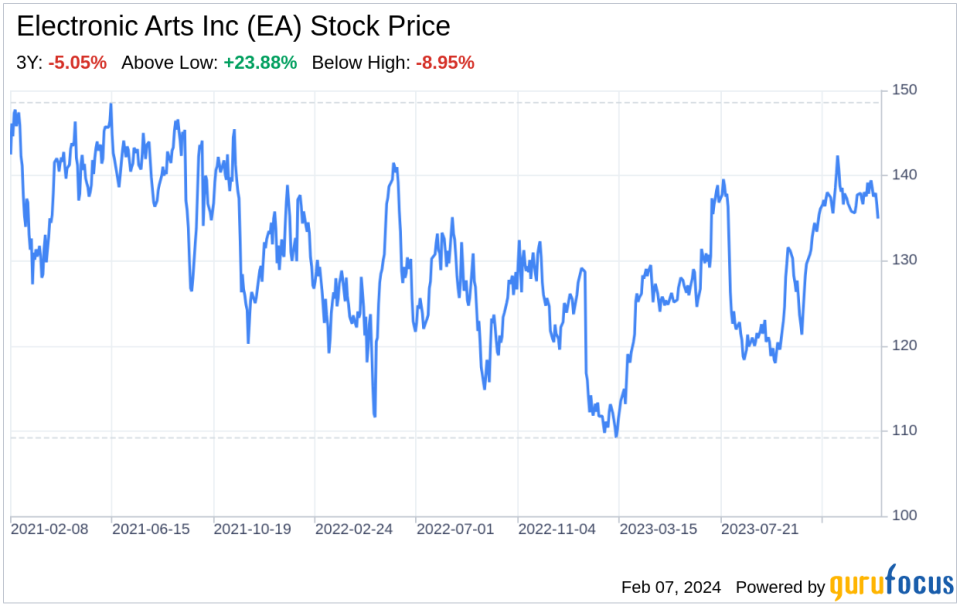Decoding Electronic Arts Inc (EA): A Strategic SWOT Insight
Electronic Arts Inc (NASDAQ:EA) showcases robust financial growth with a 3% increase in net revenue year-over-year.
EA's transition to EA SPORTS FC brand marks a strategic move in its franchise evolution.
Live services and other net revenue up by 5%, indicating a strong market presence in digital interactive entertainment.
Despite positive trends, EA faces intense competition and the need for continuous innovation in a rapidly evolving industry.
On February 6, 2024, Electronic Arts Inc (NASDAQ:EA), a global leader in digital interactive entertainment, filed its 10-Q with the SEC, revealing a financial snapshot of the company's performance. EA reported a net revenue of $1,945 million, a 3% increase from the previous year, and a net income of $290 million, up from $204 million. The company's gross profit also saw a rise to $1,416 million compared to $1,313 million, indicating a solid financial position. With a diverse portfolio of popular franchises and a transition from traditional console-based publishing to a multifaceted presence across consoles, PC, and mobile, EA is poised for continued growth. This SWOT analysis delves into the strengths, weaknesses, opportunities, and threats as presented in the latest financial filings, providing investors with a comprehensive view of EA's strategic positioning.

Strengths
Financial Performance and Brand Portfolio: EA's financial health is robust, with a year-over-year increase in net revenue and net income. The company's strong brand portfolio, including Madden, EA Sports FC, Battlefield, and Apex Legends, contributes to a loyal customer base and recurring revenue streams. EA's transition to the EA SPORTS FC brand demonstrates adaptability and a forward-thinking approach to franchise management, which could further solidify its market position.
Live Services and Digital Offerings: The company's focus on live services and digital offerings is paying off, with a 5% increase in related net revenue. This shift towards digital distribution channels enhances customer engagement and provides a steady revenue source beyond initial game sales. EA's live services strategy, which includes extra content and subscription offerings, is a testament to its innovative approach to game monetization.
Weaknesses
Dependence on Key Franchises: EA's financial success is heavily reliant on a few flagship franchises. Any underperformance or issues with these key titles could disproportionately affect the company's overall financial results. The transition to the new EA SPORTS FC brand, while strategic, also carries the risk of alienating existing fans or failing to attract new ones.
Operational Costs: The company's operating expenses have increased, with research and development costs rising to $584 million from $556 million. While necessary for innovation and maintaining competitiveness, these costs could impact profitability if not managed effectively, especially in the face of intense competition within the industry.
Opportunities
Expansion into New Markets: EA's strong financial position allows for potential expansion into emerging markets, where there is a growing demand for digital entertainment. By leveraging its existing franchises and exploring new intellectual properties, EA can tap into a larger global audience and diversify its revenue sources.
Technological Advancements: The gaming industry is rapidly evolving with advancements in technology such as cloud gaming, AR/VR, and AI. EA's investment in R&D positions the company to capitalize on these trends, offering innovative gaming experiences and potentially creating new revenue streams.
Threats
Intense Industry Competition: EA operates in a highly competitive industry, with threats from both established players and new entrants. Larger technology companies are increasingly investing in interactive entertainment, which could challenge EA's market share and necessitate continuous innovation to remain relevant.
Market Volatility: The entertainment industry is subject to rapid changes in consumer preferences and technological disruptions. EA's reliance on a few popular franchises makes it vulnerable to shifts in market trends, which could lead to fluctuations in revenue and profitability.
In conclusion, Electronic Arts Inc (NASDAQ:EA) demonstrates a strong financial foundation and a strategic focus on live services and digital offerings. However, the company must navigate the challenges of dependency on key franchises, rising operational costs, and a fiercely competitive landscape. Opportunities for expansion and technological innovation present pathways for growth, while threats from industry competition and market volatility require vigilance and adaptability. EA's strategic plans, including the transition to EA SPORTS FC and investment in new technologies, will be critical in leveraging its strengths and addressing potential weaknesses and threats.
This article, generated by GuruFocus, is designed to provide general insights and is not tailored financial advice. Our commentary is rooted in historical data and analyst projections, utilizing an impartial methodology, and is not intended to serve as specific investment guidance. It does not formulate a recommendation to purchase or divest any stock and does not consider individual investment objectives or financial circumstances. Our objective is to deliver long-term, fundamental data-driven analysis. Be aware that our analysis might not incorporate the most recent, price-sensitive company announcements or qualitative information. GuruFocus holds no position in the stocks mentioned herein.
This article first appeared on GuruFocus.
